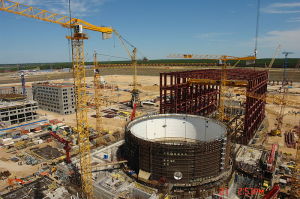Turkey to Construct First Nuclear Power Plant
 On December 1, Turkey’s first nuclear power plant was given the green light for construction by the Ministry of Environment and Urban Planning. The four-reactor nuclear plant will be built in the Mersin province, on the southern coast of Turkey.
On December 1, Turkey’s first nuclear power plant was given the green light for construction by the Ministry of Environment and Urban Planning. The four-reactor nuclear plant will be built in the Mersin province, on the southern coast of Turkey.
Rosatom, a Russian energy corporation, will build and operate the Akkuyu nuclear power plant for an estimated cost of $22 billion. Breaking ground in March 2015, the plant will be completed by 2020. It will be operational by 2023, the 100th anniversary of the founding of the Republic of Turkey.
The approval coincided with President Putin’s trip to the Turkish capital of Ankara, where he discussed relations at the fifth meeting of the Turkish-Russian High Level Cooperation Council. Sergey Kiriyenko, CEO of Rosatom, accompanied Putin during his visit.
Turkey is making an effort to finance domestic energy production projects in order to expand its energy sources and scale back its dependence on energy imports. The country is heavily reliant on oil and natural gas from Russia, Azerbaijan, and Iran. Nearly $60 billion is spent on foreign imports to generate half of Turkey’s energy production every year. The Akkuyu plant will be the first nuclear power plant of three planned, as Turkey attempts to diversify its energy resources. Three operating nuclear power plants are part of President Recep Tayyip Erdogan’s “2023 vision.”
The second nuclear energy project will be constructed in Sinop, in Turkey’s northern, Black Sea region. Following its approval, the nuclear power plant will be developed by Turkish, Japanese, and French firms. The third project will reportedly be built by Turkey’s Elektrik Uretim A.S., in cooperation with China’s State Nuclear Power Technology Corporation and the U.S.’ Westinghouse electric company.
The Akkuyu project has been met with some controversy, particularly from the Greenpeace organization. The international group states that the power plant will cause severe environmental damage to the region. Greenpeace has monitored the project throughout the year, posting videos and pictures of pre-approval plant construction earlier this spring.
In spite of this, the 3,000-page Environmental Impact Assessment report compiled for the project was approved, and plans will move forward as soon as Rosatom obtains a construction license. Rosatom states that once completed, the nuclear power plant will be functional for 80 to 100 years.
